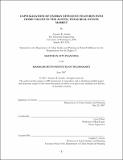| dc.contributor.advisor | Lynn Fisher. | en_US |
| dc.contributor.author | Amado, Antonio R | en_US |
| dc.contributor.other | Massachusetts Institute of Technology. Dept. of Urban Studies and Planning. | en_US |
| dc.date.accessioned | 2008-01-10T14:25:46Z | |
| dc.date.available | 2008-01-10T14:25:46Z | |
| dc.date.copyright | 2007 | en_US |
| dc.date.issued | 2007 | en_US |
| dc.identifier.uri | http://hdl.handle.net/1721.1/39848 | |
| dc.description | Thesis (M.C.P.)--Massachusetts Institute of Technology, Dept. of Urban Studies and Planning, 2007. | en_US |
| dc.description | This electronic version was submitted by the student author. The certified thesis is available in the Institute Archives and Special Collections. | en_US |
| dc.description | Includes bibliographical references (leaves 43-46). | en_US |
| dc.description.abstract | Volatile and rising energy prices have made consumers aware of their opportunity costs for energy. Information on the cost-savings of energy efficient features in homes has not been well researched to date and is an option for consumers in the marketplace. The purpose of this thesis is to empirically investigate whether energy efficient features influence the sales price of Austin residential single-family homes. The data for this study comes from the Austin Board of Realtors multiple listing service database. The results should be applicable to other US cities with similar climate. This study examines over 800 single family residences in the Austin, Texas real estate market from 1998-2004. The dataset contains green and non-green rated homes as well as twelve energy features for homes. Log-Linear regression was used to explain the variation of sales price, while factor analysis was used to reduce the number of correlated energy variables into groups of factors. The results of the regression concluded that homes in the Austin metro area with efficient heating ventilation & air conditioning systems and controls sell for 4% more than homes without these features. Pricing of other related energy features commanded a price discount on the home. | en_US |
| dc.description.abstract | (cont.) In conclusion, more efficient heating & ventilation features of new homes in Austin, Texas exert a positive influence on home prices. At least for this market, consumers appear to recognize and pay for this form of expected future energy savings. Key Words: Energy efficiency, energy policy, green homes, green rating, sustainability. | en_US |
| dc.description.statementofresponsibility | b y Antonio R. Amado. | en_US |
| dc.format.extent | 77 leaves | en_US |
| dc.language.iso | eng | en_US |
| dc.publisher | Massachusetts Institute of Technology | en_US |
| dc.rights | M.I.T. theses are protected by copyright. They may be viewed from this source for any purpose, but reproduction or distribution in any format is prohibited without written permission. See provided URL for inquiries about permission. | en_US |
| dc.rights.uri | http://dspace.mit.edu/handle/1721.1/7582 | |
| dc.subject | Urban Studies and Planning. | en_US |
| dc.title | Capitalization of energy efficient features into home values in the Austin, Texas real estate market | en_US |
| dc.type | Thesis | en_US |
| dc.description.degree | M.C.P. | en_US |
| dc.contributor.department | Massachusetts Institute of Technology. Department of Urban Studies and Planning | |
| dc.identifier.oclc | 182760581 | en_US |

